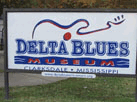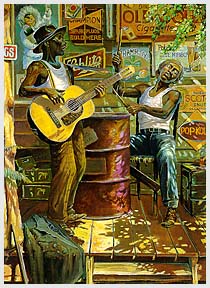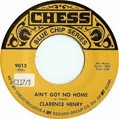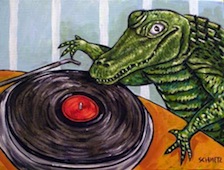Documentary series (in four parts) on the origins and development of the Blues, with archive footage of performances denoting landmarks in the blues scene. ↓ By King Rollo (1999).
# 2 – In this part ↓ we take a close look at the early legends of blues from the 1920s and 1930s.
♦ → A Musical Journey ←
¤ Feel Like Going Home (by Martin Scorsese) →
Martin Scorsese pays tribute to the Delta blues, tracing the roots of the music by traveling through the state of Mississippi with musician Corey Harris and then traveling on to West Africa. Willie King, Taj Mahal, Otha Turner and Ali Farka Toure give performances of early Delta blues songs, along with rare archival film of Son House, Muddy Waters, and John Lee Hooker.
♦ ♦ Chicago Blues ↓ A Living History
Hailed by critics, musicians and music historians worldwide as the greatest tribute of our time to the Chicago Blues.
◊ ♦ ◊ ♦ Chess Records ↓ [doc]
Brothers Leonard and Philip Chess were two Jewish immigrants from Poland who came to Chicago in 1928. They were involved in the liquor business and by the 1940’s, they owned several bars on the south side of Chicago. Their largest establishment was a nightclub called the Macomba. The Macomba had live entertainment, many of those being blues performers that had migrated to Chicago from the Mississippi delta in the ’30s and ’40s. They realized that these performers were not being properly recorded, so they decided to start recording them themselves. In 1947 they entered into a partnership with Charles and Evelyn Aron in Aristocrat Records. The Arons had just formed Aristocrat Records to record blues, jazz and rhythm & blues.
The most important artist to record on Aristrocrat was McKinley Morganfield, who recorded as Muddy Waters and had several successful singles on the label in 1947 and 1948. He had migrated from Mississippi to Chicago a few years before and was working semi-professionally until he met the Chess brothers. Initially his records contained only himself, a piano and bass and his raw singing style reflected the spirit of the bars he played in. Through their connections with radio stations and local clubs, the Chess brothers were able to build Muddy Waters into Chicago’s leading blues singer.
In late 1949, Leonard and Phil Chess purchased the interests of the Arons and became the sole owners of Aristocrat Records. On June 3, 1950, they reorganized the company and changed its name to Chess Records. Chess Records flourished in those early days of both rhythm and blues and independent record companies. Chess along with Atlantic, Aladdin, Specialty, Imperial, Modern and King were giving the public music that they could not get from the larger, established «major» record companies.
With the success of Muddy Waters, other young Mississippi bluesmen were drawn to Chicago, many joined Muddy’s band. One of the most brilliant musicians to play with Muddy was Little Walter Jacobs, whose outstanding harmonica made the band even better. In 1952, Chess formed a subsidiary label called Checker, and Little Walter recorded in his own right for the label. His first release was an instrumental called «Juke» which topped the Rhythm and Blues charts. He was able to top the charts again in 1955 with the vocal «My Babe».
A young record producer in Memphis Tennessee named Sam Phillips was recording a 300 pound farm worker named Chester Burnette, who became known as the «Howlin’ Wolf«. At the time he recorded Howlin’ Wolf, Phillips, who later established Sun Records, did not have a record company so he leased the Howlin’ Wolf masters to the Chess brothers. «How Many More Years» backed with «Moanin in the Moonlight» was a hit in 1951. Soon, Howlin’ Wolf migrated to Chicago and signed with Chess Records. In 1956, Chess was able to recapture the intensity of his earlier Memphis recordings with the hit «Smokestack Lightnin'». Howlin’ Wolf recorded for many years on Chess and was one of the most influential bluesmen in history, his influence can be heard in the music of many of the young British and American blues players that became so successful in the ’60s and ’70s.
In addition to Muddy Waters, Howlin’ Wolf and Little Walter, Chess recorded many other giants of post- war American blues such as Sonny Boy Williamson, Lowell Fulson, Memphis Slim, Jimmy Rogers, John Lee Hooker and Willie Mabon. Later, they recorded the next generation of Chicago blues artists with Buddy Guy, Little Milton and Koko Taylor.
In 1955, on a vacation trip to Chicago a young singer and guitar player from St. Louis named Chuck Berry met Muddy Waters, who encouraged him to see the Chess brothers. Chuck Berry auditioned for them with a song he had written called «Ida Red», Leonard and Phil liked the song but suggested a name change, the song was renamed «Maybellene» and became the first of his many Top 40 hits. With Chuck Berry, Chess Records had a singer whose sound could not be duplicated with cover records by white recording artists. Chuck Berry recorded for the Chess brothers for many years producing hit after hit. The songs he wrote and recorded for Chess include many of the signature songs of rock and roll; «Roll Over Beethoven,» «Johnny B. Goode,» «Sweet Little Sixteen,» «Rock and Roll Music,» «Memphis,» «Brown Eyed Handsome Man» and «School Day» among them. He is one of the giants of Rock and Roll and was one of the initial 10 inductees into the Rock and Roll Hall of Fame.
Another singer/songwriter who could not be duplicated was discovered by Chess in 1955. His name was Elias McDaniels, who had moved from Mississippi to Chicago with his family as a boy. He auditioned for the Chess brothers with a song he had written called «Uncle John». Again, they liked the song but not the title, so McDaniels changed it to his own nickname, one that he had used as an amateur boxer, Bo Diddley. The Chess brothers signed Bo Diddley to a long term contract. His distinctive «Shave and a Haircut» rhythm was a staple on Checker Records for many years. His biggest hit was the self titled «Bo Diddley» backed with «I’m a Man» in 1955.
In 1956, Chess established a jazz subsidiary called Argo, and built an impressive stable of influential jazz artists like Sonny Stitt, James Moody, Yusef Lateef, Gene Ammons, Lou Donaldson, Lorez Alexandria, Ahmad Jamal and Ramsey Lewis. In 1965 the name of the label was changed to Cadet, because of the existence of another record company called Argo in England.
Also in 1956, Chess began taking a bigger interest in music from New Orleans by signing veteran Paul Gayten to represent them there. Gayten brought then Clarence «Frogman» Henry who had a hit «Ain’t Got No Home» in 1956 and «(I Don’t Know Why) But I Do» and «You Always Hurt the One You Love» in 1961. Gayten also recorded Bobby Charles and Eddie Bo for Chess.
The Chess religious and gospel recordings are also extensive. Chess devoted an entire series to the sermons of the Rev. C.L Franklin, pastor of the 4500 member New Bethel Baptist Church in Detroit Michigan. They were also the first company to record his daughter Aretha Franklin, when as a teenager she recorded gospel music for the label. Their gospel catalog is almost exclusively contained on the Checker 10000 series and includes albums by the Five Blind Boys, Soul Stirrers, Alex Bradford and the Violinaires.
 During the early years of the label, Leonard and Phil Chess did everything. They were the quintessential ’50s record men: they owned the label, they produced the music they loved themselves and managed the financial end of the business. As the label grew, they gradually delegated more and more of the creative side of the business to employees. In 1959, they were able to hire the veteran producer Ralph Bass away from King Records in Cincinnati to serve as A&R Director. Bass continued to record blues, gospel, and rhythm and blues. He brought in a young black producer named Billy Davis who expanded the company into soul music, Davis revived the career of Etta James and turned her into Chess Records’ first soul star. A group called the Dells, which had formed in Harvey Illinois in 1953 went back and forth between Chess and another Chicago label Vee Jay several times, but when they came back to Chess in 1967, they recorded the fantastic album «There Is» which contained six hits, «Oooo, I Love You», «Stay in My Corner», «Run For Cover», «There Is», «Show Me» and «Wear It on Your Face». The Dells recorded many more albums for Cadet but never again reached the pinnacle of the album «There Is». Billy Stewart, a native of Washington D.C. first came to Chess in 1956 through Bo Diddley. Stewart played piano and sang with Diddley’s band. In 1962, Stewart returned to Chess with his unique vocal style, which involved a stuttering, rapid-fire explosion of words. He recorded a string of soul hits for Chess, including «I Do Love You», «Sitting in the Park» and «Summertime». Other soul hitmakers for Chess were Fontella Bass who had the great hit «Rescue Me», Sugar Pie Desanto, Mitty Collier, Jackie Ross, Little Milton, the Radiants, Laura Lee and Jo Ann Garrett.
During the early years of the label, Leonard and Phil Chess did everything. They were the quintessential ’50s record men: they owned the label, they produced the music they loved themselves and managed the financial end of the business. As the label grew, they gradually delegated more and more of the creative side of the business to employees. In 1959, they were able to hire the veteran producer Ralph Bass away from King Records in Cincinnati to serve as A&R Director. Bass continued to record blues, gospel, and rhythm and blues. He brought in a young black producer named Billy Davis who expanded the company into soul music, Davis revived the career of Etta James and turned her into Chess Records’ first soul star. A group called the Dells, which had formed in Harvey Illinois in 1953 went back and forth between Chess and another Chicago label Vee Jay several times, but when they came back to Chess in 1967, they recorded the fantastic album «There Is» which contained six hits, «Oooo, I Love You», «Stay in My Corner», «Run For Cover», «There Is», «Show Me» and «Wear It on Your Face». The Dells recorded many more albums for Cadet but never again reached the pinnacle of the album «There Is». Billy Stewart, a native of Washington D.C. first came to Chess in 1956 through Bo Diddley. Stewart played piano and sang with Diddley’s band. In 1962, Stewart returned to Chess with his unique vocal style, which involved a stuttering, rapid-fire explosion of words. He recorded a string of soul hits for Chess, including «I Do Love You», «Sitting in the Park» and «Summertime». Other soul hitmakers for Chess were Fontella Bass who had the great hit «Rescue Me», Sugar Pie Desanto, Mitty Collier, Jackie Ross, Little Milton, the Radiants, Laura Lee and Jo Ann Garrett.
The late ’60s were banner years for Chess, which makes the decline and fall of Chess Records hard to understand. In 1968, Billy Davis, the producer responsible for much of the soul music output, left to join an advertising agency as music director, and Leonard Chess, the creative force behind the company became more and more involved in a radio station he owned, WVON. When Billy Davis left, much of the cohesion in the creative staff was lost and many other producers and songwriters left.
 Ralph Bass stayed, but most of the talent was gone. In 1969, Leonard and Phil Chess sold Chess to General Recorded Tape (GRT) for 6½ million dollars plus 20 thousand shares in GRT stock. In October 1969, the company suffered a devastating blow when Leonard Chess died. Quality output declined, and by the summer of 1972, the Chess Chicago offices were almost empty, the distribution company and pressing plants had been closed, and only the Chess Ter Mar studio was operating with a few employees. By the summer of 1975, GRT was dismantling what was left of Chess. In August 1975, with all of the GRT record operations closed down, what remained of Chess Records, was sold to New Jersey-based All Platinum Records. Although originally intended to be run as an active label, shortage of capital reduced the great Chess Records to a reissue label. When the Chess building in Chicago was sold, the new owners brought in dumpsters and chain saws and destroyed 250,000 records that had been abandoned there. It’s sad to think of all that great music; Chuck Berry, Howlin’ Wolf, Little Walter, Bo Diddley, Etta James and Muddy Waters being hauled away to a landfill. Even though the records were destroyed, the master tapes survived and are now the property of MCA, which has rereleased much of the Chess material during the 1980s and 1990s.
Ralph Bass stayed, but most of the talent was gone. In 1969, Leonard and Phil Chess sold Chess to General Recorded Tape (GRT) for 6½ million dollars plus 20 thousand shares in GRT stock. In October 1969, the company suffered a devastating blow when Leonard Chess died. Quality output declined, and by the summer of 1972, the Chess Chicago offices were almost empty, the distribution company and pressing plants had been closed, and only the Chess Ter Mar studio was operating with a few employees. By the summer of 1975, GRT was dismantling what was left of Chess. In August 1975, with all of the GRT record operations closed down, what remained of Chess Records, was sold to New Jersey-based All Platinum Records. Although originally intended to be run as an active label, shortage of capital reduced the great Chess Records to a reissue label. When the Chess building in Chicago was sold, the new owners brought in dumpsters and chain saws and destroyed 250,000 records that had been abandoned there. It’s sad to think of all that great music; Chuck Berry, Howlin’ Wolf, Little Walter, Bo Diddley, Etta James and Muddy Waters being hauled away to a landfill. Even though the records were destroyed, the master tapes survived and are now the property of MCA, which has rereleased much of the Chess material during the 1980s and 1990s.
[by Mike Callahan and David Edwards]
◊→ «The Story Of Bo Diddley» by . . . ⇓ [1964]
♦ «I’m a Man» ↓ is a rock and roll song written and recorded by Bo Diddley in 1955. It was inspired by a moderately slow blues with a stop-time figure by Muddy Waters & Willie Dixon’s «Hoochie Coochie Man«.
Now when I was a little boy, at the age of five, I had somethin’ in my pocket,
Keep a lot of folks alive.
Now I’m a man, Made twenty-one,
You know baby, We can have a lot of fun.
I’m a man, I spell m-a-n…man.
All you pretty women, stand in line,
I can make love to you baby in an hour’s time.
I’m a man, I spell m-a-n…man.
I goin’ back down to Kansas to
Bring back the second cousin,
Little john the conqueroo.
I’m a man, I spell m-a-n…man.
The line I shoot, will never miss,
The way I make love to ‘em, They can’t resist.
I’m a man, I spell m-a-n…man.
I had somethin’ in my pocket,
Keep a lot of folks alive.
Now I’m a man, Made twenty-one,
You know baby, We can have a lot of fun.
I’m a man, I spell m-a-n…man.
All you pretty women, stand in line,
I can make love to you baby in an hour’s time.
I’m a man, I spell m-a-n…man.
I goin’ back down to Kansas to
Bring back the second cousin,
Little john the conqueroo.
I’m a man, I spell m-a-n…man.
The line I shoot, will never miss,
The way I make love to ‘em, They can’t resist.
I’m a man, I spell m-a-n…man.
The First Twenty Years →
Film about famous Chicago blues label, Alligator Records featuring icons such as Koko Taylor & Hound Dog Taylor as well as newer school blues artists like Kenny Neal, Billy Branch & Lucky Peterson.
•→ «Piano Blues» ⇐directed by Clint Eastwood
⇐’Paris’ (Mississippi)’⇐[clip_1983]
•→ The Land where the Blues Began ⇔ [transcript] ←
In the late 1970s Alan Lomax traveled to Mississippi ↑ with filmmaker John Bishop and folklorist Worth Long and made this film about the African American music he found there.dbluesm
⇐ The Blues Lives On: The Delta Blues Museum
>Marc Doyle, Chesney  Blankenstein Doyle, Jonathan Wickham, John Patrick (narrator). Located in Clarksdale, Mississippi, this museum tells the powerful story of the origins of the Delta Blues.
Blankenstein Doyle, Jonathan Wickham, John Patrick (narrator). Located in Clarksdale, Mississippi, this museum tells the powerful story of the origins of the Delta Blues.
•→Morgan Freeman’s Mississippi ⇐
¤ Blues language ⇐• From Rural to Urban … the Blues in Louisiana→
¤ Robet Wilkins
On 23rd September 1929 a blues singer in Memphis, Robert Wilkins [1896-1987] recorded a magnificent song «That’s No Way To Get Along«: intricate guitar work underpinned a lyric about how the «low down women» treated him so wrong he wished he was «dead and gone» and how «that’s no way to get along».
⇒
No way indeed. In fact, Robert, then 33 years old, was a man very different from the hard living, hard drinking blues singer stereotypes. He was a quiet teetotaller and «his songs were those of a man wondering if he was on the right path.» [Francis Davis: «The History Of The Blues: The Roots, The Music, The People»]
I’m goin’ home, friends, sit down and tell my, my mama
Friends, sit down and tell my mama
I’m goin’ home, sit down and tell my mama
I’m goin’ home, sit down and tell my mama
That that’s no way to get along
These low-down women, mama, they treated your, ahw, poor son wrong
Mama, treated me wrong
These low-down women, mama, treated your poor son wrong
These low-down women, mama, treated your poor son wrong
And that’s no way for him to get along
They treated me like my poor heart was made of a rock or stone
Mama, made of a rock or stone
Treated me like my poor heart was made of a rock or stone
Treated me like my poor heart was made of a rock or stone
And that’s no way for me to get along
You know, that was enough, mama, to make your son wished he’s dead and gone
Mama, wished I’s dead and gone
That is enough to make your son, mama, wished he’s dead and gone
That is enough to make your son, mama, wished he’s dead and gone
‘Cause that’s no way for him to get along
I stood on the roadside, I cried alone, all by myself
I cried alone by myself
I stood on the roadside and cried alone by myself
I stood on the roadside and cried alone by myself
Cryin’, «That’s no way for me to get along»
I’s wantin’ some train to come along and take me away from here
Friends, take me away from here
Some train to come along and take me away from here
Some train to come along and take me away from here
And that’s no way for me to get along
¤ Leadbelly ↓
In 1918 musician Huddie Ledbetter, known as Leadbelly was imprisoned in Texas for murder. According to tradition he won his early release in 1925 by singing a song for the governor of Texas. Leadbelly was imprisoned again, for attempted murder, in 1930. There he was “discovered” by folklorists John Lomax and Alan Lomax, who collected up to 48 songs for the Library of Congress. He was a profound influence on folk performers of the 1940s such as Woody Guthrie and Pete Seeger.¤ «Mississippi» John Hurt → ‘Spike driver blues’⇐
John Henry was a steel drivin’ boyBut he went down . . . John Henry’s house [. . .]
Tell him I’m gone – Won’t you tell him I’m gone? John Henry, he left his hammer
Layin’ side the road – Layin’ side the road
John Henry, he left his hammer
all painted in red – All painted in red Take this hammer and carry it to my captain
Tell him I’m gone, won’t you tell him I’m gone?
Tell him, I’m gone This is the hammer that killed John Henry But it won’t kill me – No it won’t kill me I walked all the way from East Colorado
Honey, that’s my home . . . That’s why I’m gone Take this hammer and carry it to my captain
Tell him I’m gone, won’t you tell him I’m gone?
◊ ◊→ Stackolee a.k.a. ‘Stagger Lee’ ⇐
Police officer, how can it be? You can ‘rest everybody but cruel Stack O’ Lee
That bad man, oh, cruel Stack O’ Lee
Billy de Lyon told Stack O’ Lee, «Please don’t take my life,
says I got two little babies, and a darlin’ lovin’ wife»
He’s a bad man, oh, cruel Stack O’ Lee
«What I care about you little babies, your darlin’ lovin’ wife?
You done stole my Stetson hat, and I’m bound to take your life»
That bad man, cruel Stack O’ Lee
…with the forty-four
When I spied Billy de Lyon, he was lyin’ down on the floor
That bad man, oh cruel Stack O’ Lee
«Gentleman’s of the jury, what do you think of that?
Stack O’ Lee killed Billy de Lyon about a five-dollar Stetson hat»
That bad man, oh, cruel Stack O’ Lee
Standing all together – Stack O’Lee at court – The judge said,
«Let’s kill him before he kills some of us.»
He’s a bad man, oh, cruel Stack O’ Lee
And all they gathered, hands way up high,
at twelve o’clock they killed him, they’s all glad to see him die
That bad man, oh, cruel Stack O’ Lee
I said, police officer, how can it be? You can ‘rest everybody but cruel Stack O’ Lee
That bad man, oh, cruel Stack O’ Lee











Deja un comentario